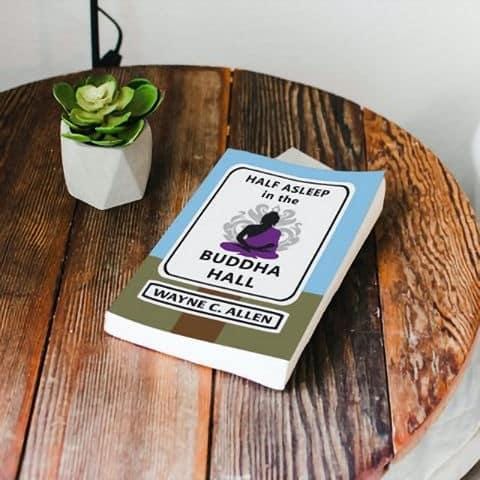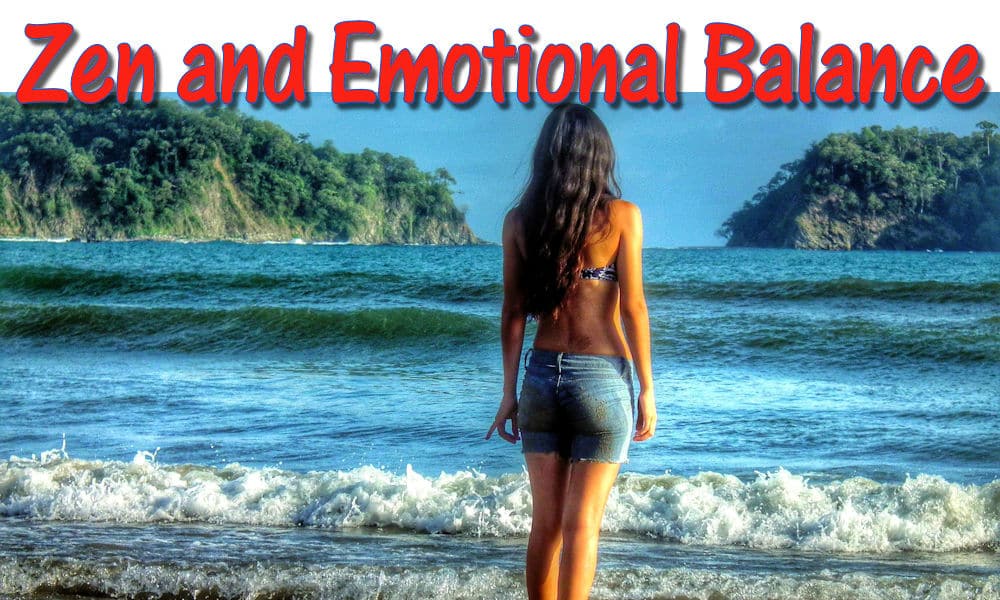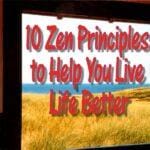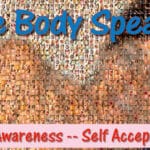- Zen 101 — Essential Zen Lessons
- Zen 101 — More Zen Ideas
- Zen 101 — Self-Responsibility
- Zen for the Holidays — 10 Tips
- Zen and Clarity — Zen Principles
- Zen and Innocence — Zen Principles
- Zen and Clinging — Zen Principles
- Zen and Karma — Zen Principles
- Zen and Emotional Balance — Zen Principles
- Zen and Simple Presence — Zen Principles
- Zen Living: 5 Ways to Land
- The Emptiness of Everything
Zen and Emotional Balance — there’s nothing “Zen” about blocking emotions. In fact, Zen is all about being real, which means being elegant — including elegance in your emotional expression.

Looking for more on this topic?
Check out my book,
Half Asleep in the Buddha Hall.
My “Eastern” book takes you by the hand and helps you to find peace of mind.
Half Asleep in the Buddha Hall is a Zen-based guide to living life fully and deeply.
(Here’s a direct Amazon link)
Purchase digital versions (Apple, Nook, Kobo, etc.) from this page
Let’s talk about Zen Principles: Zen and Emotional Balance, shall we?
We can make a few universal assertions about emotions:
- we all have them,
- we all hurt ourselves if we do not express them, and
- we all hurt ourselves and deepen the mess we are in if we express our emotions in a non-helpful way.
Zen prizes balance, and the best way to do this is to be present with our process. While many people equate balance with “neutral,” and therefore with “lukewarmness,” we think that a life well lived is more like the story of Goldilocks and the Three Bears.
Too hot, too cold, just right!
Let’s pretend that Goldilocks is a Zen teacher, and look at emotions from the perspective of her three categories.

Too hot: Rather than get into a big head trip about how we generate emotions, let’s just say that they “arise.”
We must also accept that emotions are all ours — others (or externals) do not cause us to have emotions. Emotions arise as we participate in life, and are completely and totally self-generated.
Too hot emotions are emotions that spill all over the place, and are usually covered in blame. Or perhaps better put, too hot emotions are delivered in the context of blame, while justifying the delivery by saying one is incapable of controlling them.
We hear, “It’s all your fault I am so angry, and there’s nothing I can do about my anger, because this is what I learned from my parents.” or, “I am so unhappy that you won’t do what I want you to, so I’m going to find a way to punish you for what I imaging you have done.”
Blah, blah, blah.
The problem with too hot emotion is that they burn everyone. They are never justified, but sure are they popular! Hotly expressed emotions, like a pile of manure in the living room, are pretty hard to ignore, and need shovelling before life can return to normal.

Too cold: Too cold emotions are repressed emotions.
There is a tightness about repression, and especially when emotions are stuffed over time. There is a biting off of the emotions, and thus a tight jaw. There is a disengaged quality to the person’s approach to life.
While people think there is something noble and restrained about repressing emotions, the result is internal turmoil, and often, illness.
Included in this is passive aggressiveness — acting as it nothing is wrong, but using silence and coldness as a bludgeon to get others to cooperate. Common, but not helpful.

Just Right: a balance. Emotions are felt internally, named, and expressed safely and with clarity.
It’s funny how few people reach a balance point in their lives, and especially when it has to do with emotions.
Most are stuck at either of the above poles, and rapidly swinging between the two.
The balance point, the “just right point,” is this:
I choose to safely and cleanly express my emotions without aiming them at anyone or anything. I say what I need to say, at the right volume, using “I” language, and making it clear that I am accepting responsibility for my beliefs, my emotions and my reactions.
This, of course, is a tricky walk, as no one prepares us for it.
Indeed, our society sells us either or both of the other two positions.
It’s also tricky because it requires that I stay “simply present,” and aware of my self all the time (which is how one balances anything, including life.) With no one and nothing to blame, including myself, I am simply responsible for my life, my fate and my direction.
Now, oddly and paradoxically, the more you practice this Zen-based middle way, the less you will find yourself needing to engage in emotional dumping. You’ll find that not many emotions are worth the time and energy needed to express them. You’ll notice them building, coming forward, receding and passing. Like clouds.
This differs entirely from “too cold.” Too cold is a forced repression of emotions.
“Just noticing” is letting what happens, happen. It is seeing everything and attaching to none of it. Or, as a modern Taoist might think, (cf. Stewart Wilde)
“The way it is, is the way it is.”
This week, notice your approach to your emotional life. Too hot? Too cold? Too much of both?
Re-imagine your life as “just right.” Hmm.
Zen Principles: Zen and Emotional Balance! What a concept.!





